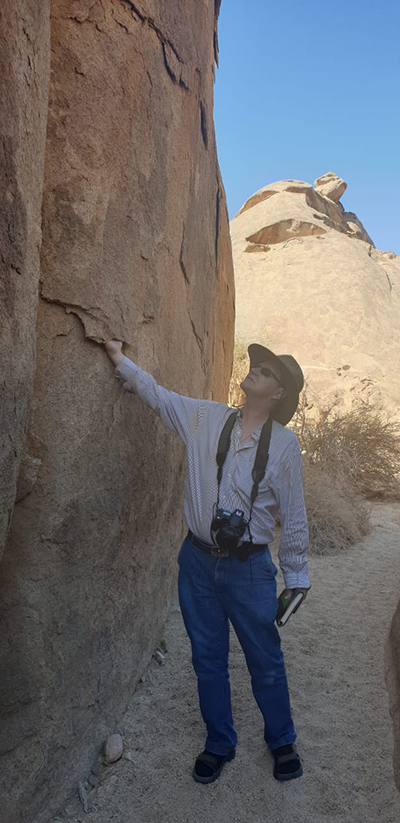
"Precambrian granite in the research area exfoliates like an onion, creating gaps and crevices. This one almost ate my hand." Joe Hobbs
To Joe Hobbs, the people of the northwestern desert of Saudi Arabia and the Eastern Desert of Egypt call to him like a favorite song playing relentlessly in his mind.
This University of Missouri Geography professor emeritus often visits the Bedouin peoples to live with, learn from, publish books and articles about, and even recently help these nomadic pastoralists, known for their resourcefulness and hospitality.
His most recent trips are to Saudi Arabia, where life is changing fast due to a more modernized government, and with those changes come lifestyle differences to the people he loves.
The Arabic-speaking Bedouins have inhabited the region for 10,000 years, and Hobbs accepts and respects their patriarchal, conservative society as it works for them. He interacts with the animals they herd: sheep, goats and camels. He admires the Bedouins’ adaptability, traditionally moving from place to place with their tents while searching for water and plant fodder for their livestock in a land that has sporadic rainfall. Even the birds and mammals migrate in this way to take advantage of the capricious rains.
“The Bedouin have historically filled a niche,” he says. “They supply meat and wool and desert herbs to people in the villages or towns, and then in turn they buy things that they can’t produce like wheat and rice and lentils they need to survive in the desert. So traditionally, pastoral nomads and settled peoples have depended upon one another.
“The settled people need the nomads for the produce they bring; and the nomads need the villagers for literally their daily bread — they make bread out of milled wheat every day.”
He’s impressed by the Bedouin’s knowledge, for example in falconry, the process of taming wild falcons to use for hunting — going back 10,000 years. “It’s a really ancient relationship,” Hobbs says. “The falcons hunt a big bird called a Bustard that people eat, and also rabbits and other animals. And it’s also a gentleman’s sport.”
They also are masters of knowledge of camel husbandry and of plants and animals, and are great trackers.
“Some men are expert trackers,” Hobbs says. “So even today in modern Saudi Arabia, I walk with these men in the wadis (valley floors) and they show me tracks of animals including wolves and foxes. They look at human footprints and they can tell you whose footprints they are, a particular man or woman or boy because of the way they walk, as everyone walks in a certain style and uproots the dust and sand differently. So, they can say ‘oh, so and so was here 12 hours ago when he was going to a certain place.’ And they can say the same thing about animals: “here was a wolf with two pups. They were here last night and you can see how they crossed the wadi and then started running.”
He enjoys the wild landscapes, which he calls “absolutely stunning,” with great mountains of granite from the Precambrian era, the earliest geologic period comprising 80 percent of geologic time from about 4.6 billion years ago when the earth began to form.
Hobbs, who spent five years as a youth in Saudi Arabia, and has visited several times since doing field research, wows over Arabia’s northwestern lava fields and cinder cones — an area rich with geothermal activity due to magma being close to the surface of the ground. He says it makes for spectacular landscapes, black volcanic cones against red granite, which is the basement rock.
He fancies the acacia trees, some large enough and thick enough to form forests, as the most important trees to the Bedouin people as they provide food and fodder year-round for their livestock as well as wild animals.
“Northwest Arabia is the only area in the Middle East I’ve been where the local people refer to ‘forests,’” he says. “They are just gorgeous.”
Just offshore are the islands with their coral reefs -- powerful to the eyes and souls of people who have a chance to see them — complete with abundant and diverse marine life and untold beauty.
To read more, click https://geography.missouri.edu/news/between-two-worlds-mu-geographer-joe-hobbs-works-bedouin-development-saudi-arabia